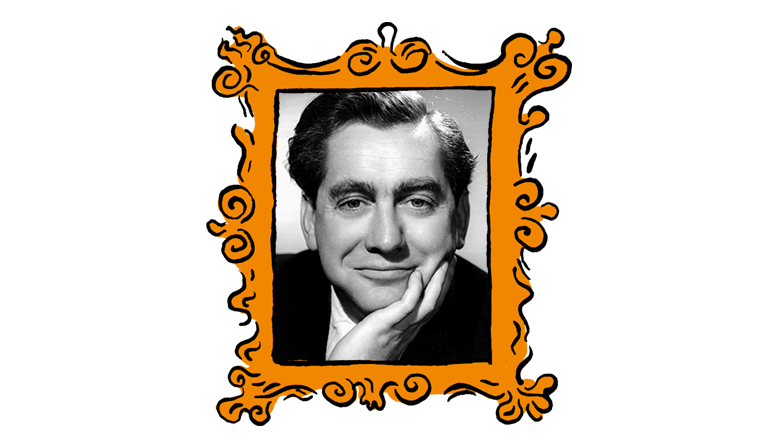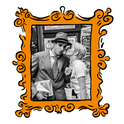Two episodes into the new Alan Partridge series, How Are You? It’s Alan—the last episode of which airs on BBC One tomorrow, though all episodes are already on iPlayer—came the opportunity to stress-test my pet theory that virtually all middle-aged, male British comedy characters are variations on Tony Hancock.
Characters in comedy programmes made in the years and decades that followed Hancock—including Basil Fawlty, Dad’s Army’s Captain Mainwaring, Rising Damp’s Rigsby, Edmund Blackadder, Alf Garnett, Father Ted Crilly and The Office’s David Brent—all presented themselves as deluded snobs, pompous as they come, desperately trying to make sense of a world they can’t understand. Laughs arise from the mismatch between how they assume the world views them and the brutal reality of how actually it does. And Tony Hancock got in on the joke first.
The first edition of his sitcom, Hancock’s Half Hour, was broadcast on BBC radio in 1954, a whole 71 years before Steve Coogan’s latest Partridge outing. In today’s diced and spliced mediascape, his popularity—a fresh episode was enough to empty Britain’s streets—is hard to countenance. Hancock’s Half Hour singlehandedly expanded the sketch format typical of the stage variety shows where he’d found his feet as a young comedian into half-hour narrative wholes.
Episodes such as “The Blood Donor”, “Radio Ham” and “Reunion Party” are now considered First Folio texts of British comedy. When Hancock goes to donate blood and is informed a whole pint is needed, his response, “That’s very nearly an armful”, reveals both the depth of his ignorance but also his unflappable confidence as he displays it. Working with his writers Alan Simpson and Ray Galton, Hancock created that comedy archetype of a world-weary loser with more self-certainty than actual ability.
His signature Homburg hat and Astrakhan raincoat, with its raised collars, might have been a metaphor for his determination to keep the wider world at bay. He personified faded glory, symbolised by his decrepit house in East Cheam, at 23 Railway Cuttings. His best friends were Sid James—a small-scale scoundrel, like a Pound Shop Kray Twin—and Bill Kerr, his Australian lodger who, despite Hancock’s pretence of dignity, insisted on calling him “Tub”, apparently a comment on his waistline. Later he moved to Earl’s Court and tried to wing it as an intellectual. He loathed new-fangled “frothy coffee” in new-fangled coffee shops, and it’s hard to imagine anyone less suited to the emerging era of sex, drugs and roll ’n’ roll.
When I interviewed John Cleese back in 2016, as he was preparing to premiere Fawlty Towers: The Play in Australia, I mentioned to him that Monty Python’s surreal buffoonery is usually thought to have spilt out of Spike Milligan and The Goons—but, I asked, had Hancock rubbed off on him too? He remembered writing a line for Basil and realising a few days later that “it had a definite Hancock inflection, enough to remind me that influences can be unconscious”. Cleese told me that much of the comedy in Fawlty Towers sparked from Basil being “probably quite a smart young chap, not at all stupid—but I don’t think he’s especially well educated”, which could also stand as a neat analysis of the Hancock character.
Cleese added that “all British comedy is about class and mostly about people trying to move up a class and being held back”. In Fawlty Towers, we glimpse Basil’s intellectual aspirations, such as when his desire to relax by listening to Brahms is utterly crushed by his wife Sybil whinging about him “listening to that racket”. We’re left in no doubt that Hancock yearns to join his local Conservative Association and maintains intellectual pretensions of his own: in “The Bedsit” he attempts to read Bertrand Russell’s Human Knowledge: Its Scope and Limits but fails to get much beyond the first sentence before reaching for his dictionary.
This idea of self-betterment persisted in later comedy programmes, too. Captain Mainwaring is ostensibly Sergeant Wilson’s senior in Dad’s Army, but the higher-class Wilson is quite obviously more assured and urbane. Aspiring for more also feeds Father Ted’s certainty that being marooned on Craggy Island is beneath him. More recently, Larry David’s persona in the US series Curb Your Enthusiasm pivoted around his belief that the world around him was lacking, and that he himself was never at fault. (The idea of a comedic, exaggerated persona being played under an actor’s own name was, of course, kickstarted by Hancock.)
But what did Cleese mean by a “Hancock inflection”? To hear it is to know it. Where Hancock’s strong beats landed in a sentence was very much wrapped up in his horror of being considered stupid. Faked confidence lent the tail ends of his sentences undue stress, often delivered with an upward infection coated in a nervous laugh—you do agree with me, of course you do, that I am right (chuckle, chuckle)? The “Hancock inflection” is everywhere: listen to Richard Briers in The Good Life or to Leonard Rossiter as Rigsby pleading his worthiness as love interest to Miss Jones; it powers their lines forwards.
The brilliant but almost forgotten 1988 sitcom Colin’s Sandwich, starring Mel Smith as an aspiring horror writer who is stuck in a dead-end job working for the British Rail complaints department, is virtual Hancock transcription. Smith’s downtrodden demeanour and slumping facial expressions, and his desperation to establish his credentials as an author, are completely in the tradition—not to mention how he delivers his lines in the Hancock manner.
Which—aha!—returns us to Partridge. The premise of Alan’s latest series—that he’s the first celebrity ever to make a television series about mental health—is itself a delightful Hancockian delusion of grandeur. In the second episode, I watched Partridge return to North Norfolk Digital to make amends, then fall out again, with his onetime radio sidekick Simon Denton—played by the superb Tim Key—with the ghosts of Hancock and Sid James in my mind’s eye, quarrelling as Sid refuses to recognise Tony’s superiority.
The variation Coogan brings to the Hancock theme is that Alan has precisely no intellectual ambitions at all. Culture to him is Roger Moore and air guitar. But that fundamental confidence–ability equation holds steady. Alan has enough of the former to get by—but knows, deep down, he has zero of the latter, a painful truth that he can never admit to himself. Which, let’s be honest, speaks to something in us all.
The persistent influence of Tony Hancock
Alan Partridge? David Brent? Captain Mainwaring? These deluded characters all share the same father
November 06, 2025

Image: Allstar Picture Library Ltd / Alamy











